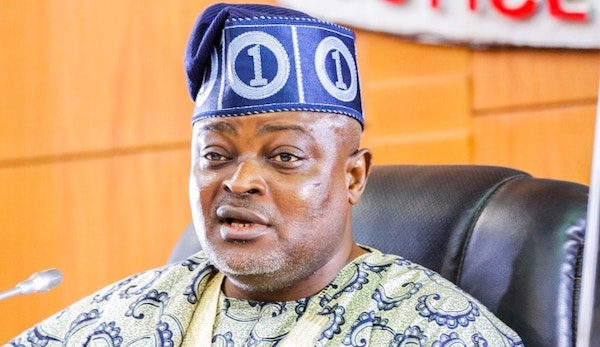Former Lagos State House of Assembly Speaker Mudashiru Obasa has launched a legal offensive against his recent impeachment, filing a lawsuit that threatens to shake the political foundations of Nigeria’s economic capital. The high-stakes legal challenge, submitted to the Lagos High Court, directly confronts both the new Speaker, Lasbat Mojisola Meranda, and the entire House of Assembly.
The dramatic development stems from Obasa’s controversial removal on January 13, 2025, which the former Speaker now claims violated constitutional procedures and assembly protocols. Through his legal filing submitted yesterday, Obasa seeks not just to invalidate his impeachment but to reclaim his position at the helm of Lagos State’s legislative body.
At the heart of Obasa’s legal argument lies a procedural challenge that questions the very legitimacy of the session that led to his removal. His legal team contends that the January 13 plenary session occurred during a formal recess period without proper reconvening procedures, potentially rendering all decisions made during that session – including his impeachment – constitutionally void.
The lawsuit’s timing adds another layer of complexity to Lagos State’s political landscape, as the assembly grapples with leadership transition amid ongoing legislative responsibilities. By challenging both the new Speaker and the entire House of Assembly, Obasa has effectively forced a constitutional crisis that could impact the functioning of Lagos State’s legislative branch.
Legal experts following the case note that Obasa’s challenge hinges on specific provisions within both the Nigerian Constitution and the Assembly’s standing orders. These regulations establish strict procedures for conducting legislative business, particularly for actions as significant as removing a Speaker. If Obasa’s claims about procedural violations prove accurate, it could potentially nullify not just his removal but any other decisions made during the contested session.
The former Speaker’s legal strategy appears carefully crafted to highlight what he perceives as fundamental flaws in the impeachment process. By focusing on procedural irregularities rather than the substantive reasons for his removal, Obasa’s legal team aims to challenge the technical validity of the proceedings rather than defend against specific allegations.
Political observers suggest this legal battle could have far-reaching implications for legislative procedures across Nigeria’s state assemblies. The case may establish important precedents regarding the proper conduct of legislative business during recess periods and the requirements for valid impeachment proceedings.
While the court has yet to assign a judge or set a hearing date, the lawsuit has already sparked intense discussion among legal scholars and political analysts. Many point out that the outcome could significantly impact how state legislatures conduct their affairs, particularly regarding leadership changes and emergency sessions.
The case also raises questions about the stability of legislative leadership in Nigeria’s most economically significant state. Lagos, as the country’s commercial capital, requires stable governance to maintain its economic momentum. Any prolonged leadership dispute in its legislature could potentially affect investor confidence and government efficiency.
For the current Speaker, Lasbat Mojisola Meranda, and the House of Assembly, this legal challenge presents a significant test. They must now defend not only the decision to remove Obasa but also the procedural validity of how that decision was reached. Their response to the lawsuit will likely shape public perception of the assembly’s commitment to constitutional procedures.
As the legal process unfolds, stakeholders across Lagos State’s political spectrum watch closely, aware that the outcome could reshape the balance of power within the state’s legislative branch. The case also serves as a reminder of the importance of procedural integrity in democratic institutions, even during politically charged moments of leadership transition.
The timing of the court’s response and the eventual hearing will be crucial factors in determining how this political drama unfolds. Until then, Lagos State’s legislative body must navigate its responsibilities under the shadow of this constitutional challenge, while observers wait to see whether Nigeria’s judicial system will uphold or reject Obasa’s claims of procedural impropriety.



